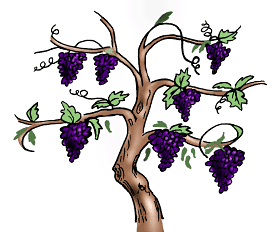First Reading: Acts 15:1-6
Responsorial Psalm: Ps. 121(122):1-5
Gospel Reading: John 15:1-8
____________________________________
Doctrinal conflicts in the church are quite tough. It is disorienting, confusing, and damaging. Jesus spoke of false prophets who would come in among the disciples (cf. Matt. 7:15–20). Likewise, Paul also warned that wolves would arise from among the Church and would not spare the flock (cf. Acts 20:29–30). Thus, confronting the threats of ‘false prophets’ necessarily involves conflicts. This we see in today’s first reading.
In the first reading, we see a clear case of conflict involving the Jewish converts to Christianity who had come from Judea and the Gentile converts coordinated by the Apostles (Paul and Barnabas). The bone of contention was stark: “Unless you have yourselves circumcised in the tradition of Moses you cannot be saved.” We are told that this led to intense arguments among them until they resolved to go to Jerusalem and discuss the problem with the apostles and elders. That resulted to the Council of Jerusalem or Apostolic Council that was held in Jerusalem around AD 50 in an attempt to resolve some complications in the Church, of which circumcision was among them. For some of the Jewish converts, circumcision is the “everlasting” sign of the Abrahamic Covenant (Genesis 17:9–14), which cannot be denied; however, how could this be understood after the death of Christ? Thus, through the Council of Jerusalem, we come to understand how the sacrificial death of Christ relativized circumcision and other Levitical practices in Judaism. Much later, we shall come to understand from Paul how baptism has replaced circumcision (cf. Col. 2:11–12). Thus, baptism as “the circumcision in Christ” (the circumcision made without hands) became necessary for salvation. Therefore, baptism makes us members of Christ and incorporates us into Christ’s mystical Body, the Church (cf. CCC #1213).
Apparently, the message of belonging to the mystical Body of Christ (members of Christ) is what is mirrored today in the Gospel. Here, we hear Christ saying: “I am the vine, you are the branches. Whoever remains in me, with me in him, bears fruit in plenty; for cut off from me you can do nothing. Through our baptism, we are called to remain with Christ, the one true Vine, for cut off from him, we can do nothing. There is nothing less mechanical than the image of the vine and the branches that Jesus offers us in today’s gospel reading. It is a vibrant, living, dynamic, image. As a result, Jesus invites us to make our home in him, as he makes his home in us. He desires an intimate relationship with us, a relationship of love. Notice that he says, every branch that does bear fruit, the Father prunes to make it bear even more.
Dear friends in Christ, there are some things we may need to shed if we are to become all that God is calling us to be. Some experiences of letting go, which can be very painful at the time, can help us to grow in our relationship with God and with others. Yet, during those painful experiences of pruning in our lives, the Lord is in communion with us. In the words of the gospel reading, he makes his home in us, he remains in us. We don’t have to face into that experience of being pruned on our own, or in the strength of our own resources alone. The Lord who makes his home in us will sustain us in those times and will lead us through the painful experience of pruning into a new and more fruitful life. However, for that to happen we need to remain in him as he remains in us; we need to keep in communion with him, as he is in communion with us.
Shalom!
© Fr. Chinaka Justin Mbaeri, OSJ
Paroquia Nossa Senhora de Fatima, Vila Sabrina, São Paulo, Brazil
nozickcjoe@gmail.com / fadacjay@gmail.com


